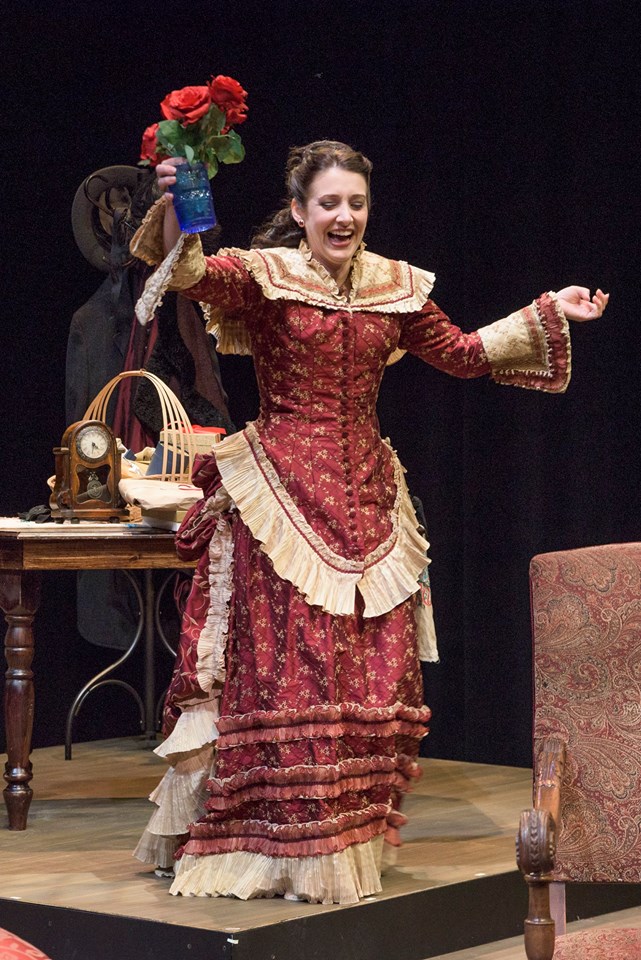Through Sun 8/27
Welcome to the cozy parlour of Thorwald and Nora Helmer, two citizens evidently enjoying a conventional, prosperous marriage in 1879 Norway. Cleveland’s five-year-old Mamaí Theatre company takes advantage of the “Helen” Lab Theatre’s close quarters to turn Henrik Ibsen’s A Doll’s House into an engrossing and intimate drama about marriage and choices.
Take a seat near the living area and watch as Nora sets it on fire (metaphorically speaking, of course) when she realizes that the childish dream she’s been living has turned her into a creature she can no longer be. Yes, the play’s been claimed by feminists, but it’s that and more. It also shows the duties and pressures social assumptions place on both men and women.
Director Christine McBurney’s evident attention to pace makes life at the Helmers’ move swiftly, at times humorously, as the Helmers and their friends celebrate Christmas and then fall apart the day after. This is the version “modernized” (in the 1930s) for American audiences by Thornton (Our Town) Wilder, and even though language has changed (yet again), the story still rings true.
When we first meet her, Nora Helmer seems a perfect airhead. Anjanette Hall’s Nora, juggling parcels and popping sweets into her mouth at a furious pace, sweeps into the living room like a scatterbrained beauty afflicted with a serious shopping disorder. She’s assisted into the house (packages, toys and all) by Anna (Mary Alice Beck), the stalwart servant who manages the (always) offstage children as well as everything else in the house.
Nora’s only real job is to take care of husband Thorwald (Abraham Adams). Adams’ Thorwald, while sometimes an outrageously drunk mansplainer (in a delicious after-the-party scene), manages to show a sympathetic, vulnerable presence not always seen in other productions of this play.
Life begins to get complicated when Nora’s old friend Christina Linden (Rachel Lee Kolis) drops by, asking for help finding a job. As Christina, Kolis convincingly manages her character’s alternating confidence and desperation.
Next Nils Krogstad (John Busser) drops in and attempts to call in a favor that Nora owes him. Now we learn that she’s been keeping a big secret from her husband, one she justifies by claiming she’s protecting not only his health, but his ego. Meanwhile, family friend Dr. Rank (a charming Tim Keo who sports a dashing long-haired look) continues his role as Nora’s best friend and confidant (her husband simply condescends to her).
It’s a small, first-rate cast that makes each character live and the observer care about them. I had a little trouble at the drama’s conclusion when Hall’s voice and demeanor switched from playing Nora as a child to showing her as a lecturing, door-slamming woman. It was as if Cate Blanchett suddenly replaced Kate Hudson. The change would have come, but in time, not so dramatically, so quickly.
The beautiful set allowed good views from both sides of the L-shaped seating area and costumes and props contributed greatly to the Victorian-era effect. Kudos to scenic designer Don McBride, costume designer Kristine Davies, lighting designer Marcus Dana, sound designer Richard Ingraham and properties designer Monica Plunkett.
BOTTOM LINE: An excellent production in a perfect venue that should delight just about anyone — even those who are afraid of classic Norwegian drama or establishment feminism. This is neither — it’s just great theater.
For tickets go to playhousesquare.org or 216-241-6000.
[Written by Laura Kennelly]
